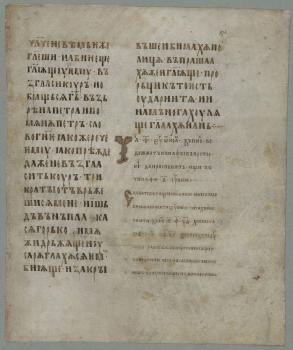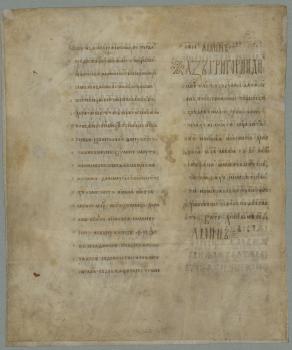Ostromir Gospels
When the Ostromir Gospels was Сreated
The Ostromir Gospels was created in the age of the cultural rise and flowering of the ancient Russian state, which followed an official adoption of Christianity as a state religion in 988. Separate pagan East Slavic tribes were introduced into the centuries-old Christian cultural tradition. Spreading of Slavic writing in Russia is also connected with Christianization. In the Russian Primary Chronicle, called the Tale of Bygone Years, (a history of Kievan Rus' from about 850 to 1110), the entry for 988 (see Laurentian Codex, fol. 41 after a story of the baptism of Kiev) tells how Vladimir the Great (the ruler of Kievan Rus' from 980 to 1015) initiated the book education reform. The Grand Prince of Kiev loved "words of books" and began to send the children of the best people to learn. The entry for 1037 from the same source informs that Vladimir's son - Prince Yaroslav, nicknamed the Wise (circa 978-1054) - organized the translation and copying of books, thereby establishing the first Russia's library in Kiev. In the Tale of Bygone Years, books are called "sources of wisdom," "rivers that feed the whole universe". (See Laurentian Chronicle, fol. 51 v).
The last leaf of the Ostromir Gospels carries an afterword written by the scribe Deacon Gregory. In his Epilogue, Deacon Gregory informs that he copied this Gospel lectionary by the order of the famous Novgorod governor Ostromir, in the reign of Grand Prince Izyaslav of Kiev (1024-1078), son of Yaroslav the Wise. The work was started on 21 October 1056 and finished on 12 May 1057 (thus, the book was produced for seven months). Particularly emphasized is the high social status of Ostromir. Ostromir was a member of an influential Russian clan. His grandfather Dobrynya (who served as a prototype for the epic hero Dobryny Nikitich) was an uncle of Grand Prince Vladimir, the Baptist of Rus'.
Ostromir was a nephew of Grand Prince Vladimir, an uncle of Grand Prince Izyaslav of Kiev. He commissioned the magnificent book when he was at the zenith of his fame, because he considers his governing in Novgorod almost as a co-reign with the Grand Prince of Kiev. In his Epilogue, Deacon Gregory mentioned the Grand Princes Yaroslav and Vladimir (the father and brother of Izyaslav), the wife of Ostromir Theophania (the Greek name testifies for her aristocratic origin) and their children with their wives (without names). It is known from chronicles that Ostromir died around 1060, leading the Novgorod army in a campaign against the Chud tribe.
Of particular interest are the start and end dates indicated by Deacon Gregory. 21 October is the day of Hilarion the Great's memory. This name is associated with St. Hilarion of Kiev, an outstanding Slavic church and political figure of the mid-11th century. St. Hilarion of Kiev was the first non-Greek Metropolitan of Kiev, an orator and writer. Hilarion co-worked with Grand Prince Yaroslav the Wise for the political and ideological independence of Rus' from Byzantium. He played an important role in the enlightenment of Rus', organized a scriptorium for book-copying at the St. Sophia Cathedral in Kiev. Deacon Gregory did not accidentally began his work on the Feast Day of Saint Hilarion.
12 May, the date when he completed the Ostromir Gospels, also evokes rich historical associations. This date refers to the 4th century, when Christianity first became the state religion in the Byzantine Empire. When Emperor Constantine the Great founded Constantinople, he dedicated the city to the Mother of God. Constantinople's official anniversary is 11 May. The first Christian temples in Russia were consecrated on 12 May. It is significant that the brothers Cyril and Methodius, spiritual enlighteners of the Slavs, are also commemorated these days. Saints Cyril and Methodius' Day is now widely celebrated as the Slavonic Literature and Culture Day.

